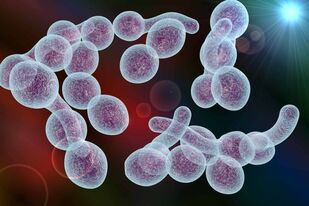In most cases, men face chronic congestive prostatitis, the development of which is caused by impaired blood circulation and thickening of prostate secretion. This form of inflammation is considered a disease of older men. In approximately 20% of cases, patients in urological clinics are diagnosed with bacterial prostate - an acute form of prostate inflammation, which does not depend on age and is caused by the action of pathogenic microorganisms.
Causes of bacterial prostatitis

As is clear from the name of the diagnosis, the cause of the disease are bacteria that enter the prostate gland by the lymphogenic or hematogenous route.
Infection of the prostate with lymph flow occurs with the development of various inflammatory diseases of the genitourinary system.
With blood circulation, the infection enters the prostate gland against the background of serious infectious diseases such as influenza, acute tonsillitis or pneumonia.
Most often, pathogenic microorganisms enter the prostate through the urethra. Infection occurs against the background of diseases of the genital organs.
With bacterial prostatitis, the causes lie in the action of pathogenic microbes, but the general condition of the body does not matter, as the disease develops only with reduced immunity. Reasons for weakening the body's protective function:
- hypothermia;
- vitamin deficiency due to an unbalanced diet;
- antibiotic therapy;
- stress;
- hypodynamics;
- chronic focus of infection;
- bad habits;
- prolonged sexual abstinence;
- rude sex.
The disease is characterized by acute, rapidly growing symptoms. Unlike congestive prostatitis, bacterial inflammation is age-independent and occurs in young men.
Diseases of the disease
Bacterial prostatitis is distinguished by the type of pathogen and the degree of involvement of prostate tissue in the inflammatory process.
Staphylococcus aureus most often provokes prostatitis. This form of the disease is characterized by the formation of abscesses in the prostate tissue, accompanied by an increase in temperature and the release of pus from the urethra or anus. This form of the disease can be a complication of the flu, pneumonia or a consequence of the presence of a chronic focus of infection in the body.Among the conditionally pathogenic microorganisms that provoke prostatitis, E. coli and Pseudomonas aeruginosa occupy the first place in prevalence. This form of the disease develops against the background of a decline in immunity. Pathogenic microorganisms enter the prostate gland by the lymphogenic route.
Chlamydial prostatitis is a consequence of promiscuous sex. Chlamydia infection from a partner is asymptomatic, however, against the background of a decline in immune defense, bacteria can enter the prostate gland, provoking inflammation.
One of the most serious forms of bacterial prostatitis is inflammation of the fungus or candida. It develops with the penetration of Candida fungi into the prostate gland. The disease develops slowly and for a long time may not appear with vivid symptoms. Often, the fungal form of inflammation turns into chronic prostate.
Treatment of abacterial prostatitis caused by fungal microflora requires an integrated approach, as fungi quickly develop resistance to the action of antifungals.

Candida does not show its presence for a long time and is difficult to treat.
Acute bacterial prostatitis may be associated with the formation of purulent foci. There are several types of diseases, according to the degree of involvement of prostate tissue in the inflammatory process:
- catarrhal;
- follicular;
- parenkimal;
- prostate abscess.
Follicular prostatitis is associated with the formation of abscesses in glandular tissue. This form of the disease manifests itself with high fever, but it is treated quite effectively with antibiotics.
In parenchymal inflammation, the pathological process spreads throughout the organ. At the same time, the prostate increases in size, its contours change and edema develops. In the absence of timely treatment, this form of the disease can develop into chronic prostate.
Prostate abscess is the formation of a cavity filled with pus. Due to the abscess, there is a high fever and symptoms of intoxication. When an abscess erupts, immediate relief occurs, but the entry of purulent contents into the general bloodstream can lead to sepsis. This form of the disease is characterized by acute pain syndrome, high body temperature, and severe intoxication of the body. The abscess is opened with surgery.
The listed types of the disease are also stages of development of acute bacterial prostatitis. In the absence of timely treatment, one stage passes to another, symptoms worsen, the risks of complications increase.
Symptoms of the disease
Symptoms of bacterial prostatitis depend on the stage of the inflammatory process. The initial stages of the disease are characterized by the following symptoms:
- pain in the bladder area;
- frequent request to use the toilet;
- pain after urination;
- general illness.
As bacterial prostatitis progresses, symptoms worsen. Body temperature rises, pain syndrome rises, urinary problems worsen.

In severe cases, severe intoxication is possible, accompanied by nausea and vomiting, loss of strength and dizziness. Body temperature can rise to 40 ° C.
Frequency of toilet calls can be up to 10 times per hour. In this case, the man feels the fullness of the bladder, after urination there is no relief.
In severe cases, acute urinary retention may develop. This is accompanied by a feeling of bladder distension with a complete inability to empty it. This complication is very dangerous and requires hospitalization with subsequent installation of a catheter.
Frequent urination is caused by compression of the bladder by an inflamed prostate.Why is prostatitis dangerous?
The risk of bacterial prostatitis is the risk of infection of the pelvic organs. If urination is impaired, urinary incontinence is possible, leading to kidney infection. This condition is called pyelonephritis and is difficult to treat.
One of the most common complications of bacterial prostatitis is cystitis, which becomes chronic. The disease is characterized by inflammation of the bladder mucosa and is accompanied by frequent desire to use the toilet, cramps and pain in the bladder, hematuria.
Inadequate or inadequate treatment of bacterial prostatitis can lead to chronic disease. If acute bacterial prostatitis is successfully treated with antibiotics, the treatment of chronic disease is exacerbated by periodic exacerbations of symptoms, which occur against the background of a decline in immunity.Acute bacterial prostatitis can cause infertility and impotence.
The most dangerous complication is the eruption of an abscess in the prostate cavity. Purulent masses with blood and lymph flow are carried through the pelvic organs, provoking inflammation of the rectum, bladder, and kidneys. In severe cases, an outbreak of the abscess can lead to sepsis.
Disease Diagnosis
The primary examination of the prostate is the digital examination (palpation of the colon). If bacterial prostatitis is suspected, when the patient has symptoms of intoxication and high fever, prostate massage is not performed, in order to avoid the risk of worsening of symptoms.
Diagnosis is based on ultrasound or TRUS. Treatment of bacterial prostatitis depends on the type of inflammatory agent. For this purpose, it is necessary to analyze prostate secretion. Since in acute inflammation rectal examination of the prostate is prohibited, urine is taken for bacteriological analysis of the causative agent of prostatitis. It is also necessary to pass a general and biochemical blood test.
Based on the results of the urine test, the doctor selects antibiotics and bactericidal drugs to treat prostatitis.
Treatment of Bacterial Prostatitis
How to treat bacterial prostatitis depends on the type of pathogen. The choice of antibiotic therapy for prostatitis is carried out depending on the sensitivity of pathogenic agents to the action of certain drugs.
Antibiotic treatment can be supplemented with rectal suppositories - these are antibacterial and anti-inflammatory suppositories used for prostate.
Non-steroidal anti-inflammatory drugs, antipyretic drugs with anti-inflammatory action, antispasmodics help reduce the signs and symptoms of bacterial prostatitis. These medications do not cure prostatitis, but they can relieve pain and ease the course of the disease.
Folk remedies
Once you understand how to cure prostate gland with bacterial prostate with the help of medication, many will be interested in the possibility of alternative treatment.
Among the effective methods of treating prostatitis with folk remedies, the most effective are rectal suppositories with propolis. You can cook them yourself. To do this, melt 200 g of cocoa butter in a water bath and add 40 g of crushed propolis to it. The tools are boiled until the propolis dissolves and the mass acquires a uniform color and consistency. The medicine is then cooled in the refrigerator, having previously formed a cone from the mass, using food film. After cooling, the cone is cut into small torpedoes, about 2 cm in diameter and 4 cm long. Suppositories are stored in the refrigerator, used twice a day - in the morning and in the evening. The course of treatment lasts two weeks.
Walnuts and pumpkin seeds can help speed up healing. To prepare the medicine, grind 100 g of raw peeled walnuts and seeds in a coffee grinder and then mix with a glass of honey. From the resulting mass, balls are made, about 2-3 cm in diameter. You should eat 3 of these balls every day.
Men are also encouraged to eat walnut kernels with honey. To prepare the medicine, a glass of chopped nuts is mixed with honey and insisted for three days in the refrigerator. Then the drug is taken three tablespoons daily.
Prevention
Bacterial prostatitis is a dangerous disease that can become chronic. In most cases, timely treatment can successfully save the disease, but no single man is safe from a recurrent episode of prostatitis. To prevent the development of bacterial prostatitis, you need:
- weather clothing;
- avoid hypothermia;
- cure any infectious disease in time;
- protect themselves during sexual intercourse.
When taking antibiotic or corticosteroid therapy for a long time, you should consult your doctor about how to prevent the deterioration of the immune system.
You should pay attention to your immunity, as the weakening of the body's protective function leads to the development of an acute inflammatory process in the prostate. To this end, it is recommended to take a course of vitamins designed specifically for men every year, to monitor the diet and to avoid stress.
























